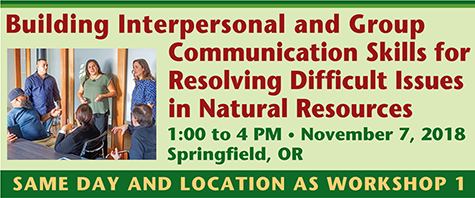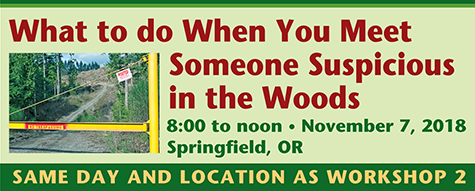Building Interpersonal and Group Communication Skills for Resolving Difficult Situations and Conflicts in Natural Resources

Location: Holiday Inn, Springfield, OR
Workshop 2: Building Interpersonal and Group Communication Skills for Resolving Difficult Situations and Conflicts in Natural Resources
1:00 to 4 PM, November 7, 2018
Holiday Inn, Springfield, OR
Do you cringe at the idea of approaching a neighbor regarding shared expenses? Would you rather eat the costs instead of talking to a contractor about a service that did not meet expectations? Do you want to skip watershed or forest collaborative meetings when you know the topic will be heated? Why talk to people you disagree with in the first place?
As much as we would like to avoid uncomfortable conversations, it is often crucial for progress. Today more than ever it is important for us as foresters, members of organizations, or just citizens in our communities, to be able to engage in open and productive discussions over difficult or controversial issues. This class will help you develop practical skills, and give you some tools and processes that will help you and any organizations you participate in to work through difficult scenarios. Bring your real-life challenges, we will work on them!
Topics Covered will Include:
- Reframing Conflict as an Opportunity
- Understanding Conflict Styles
- Active Listening Principles and Skills
- Conflict in Group Settings
- Collaborative Leadership Skills
- Setting Meetings up for Success
Different workshop, same day, same location. Details below…
Workshop 1: What to do When You Meet Someone Suspicious in the Woods: Intervention and Contact Guidelines for Forestry Personnel
8:00 am to 12:00 pm, November 7, 2018
Holiday Inn, Springfield, OR
- What are the basic factors for safe encounters in the woods? These actions will help keep you safe in uncertain situations: tactical plans, communication, proper tactics, physical condition and positive mental attitude.
- What are the warning signs of a potential attack? Recognizing the signs of posture, verbal threats, disobeying instructions and positioning.
- How should you respond to a potential attack? Avoid the mistakes of rushing when not required, relaxing too soon, not practicing, not utilizing cover and assuming a tough guy attitude.
- What are the guidelines for maintaining your safety in attack situations? Follow the guidelines of not being afraid to be afraid, knowing your capabilities and knowing what the other person is capable of.
- How do you assess a threat? What are the early signs of a potential attack? How can you analyze the threat? When to escalate your level of resistance. Avoiding over reaction and under reaction.
- What to do if the situation arises to a physical confrontation and how to respond to danger.
- Who do you call before, during and after? Maintaining communications with local law enforcement.
- Dealing with dumping and squatting on your ownership.
About the Instructors:
Workshop 1 - What to do When You Meet Someone Suspicious in the Woods: Intervention and Contact Guidelines for Forestry Personnel
Steve Kellis is currently Liquor Inspector, Oregon Liquor Control Commission. He was a Deputy Sheriff for 16 years with the Clackamas County Sheriff’s office where he served on the Forest and Mountain Patrol, the Dump Stoppers Program and was a lead instructor in officer survival, high-risk patrols, and environmental crimes investigations. He was also vice president of training and an instructor for 5 years with the Institute of Public Safety Training. Steve has been an incident commander for search and rescue operations and emergency preparedness. He was an investigator in the security division for OR and WA timberlands of Longview Timber and Weyerhaeuser for 13 years.
Workshop 2 - Building Interpersonal and Group Communication Skills for Resolving Difficult Situations and Conflicts in Natural Resources
Emily Jane Davis is a qualitative social scientist with the Extension Service at Oregon State University. She focuses on collaboration, social and economic aspects of natural resource management, policy impacts, wildfire management, and rural development. Emily provides applied research and technical assistance to natural resource partnerships and collaborative efforts. Her skills include meeting and process design, social and economic monitoring protocols, communications and outreach, strategic planning, facilitation, grant reviews, partnership development, program and project evaluation, and workshop and event planning. She has a PhD and MA from the University of British Columbia and a BA from McGill University.
Nicole Strong is a Forestry and Natural Resources Extension Agent with Oregon State University serving the Oregon counties of Crook, Deschutes, Jefferson as well as the Confederated Tribes of the Warm Springs. She has served Oregon landowners, natural resources professionals, and forest collaborative groups since 2004. Her research and work focus on empowering family woodland owners by fostering community, developing leadership skills, and increasing informed decision making through acquisition of confidence and relevant knowledge and skills. Nicole has taught facilitation, leadership, and conflict skills at several Tree Schools, professional association meetings, and at the CISPUS Institute, giving natural resource professionals proven, innovative communication and collaboration skills. Nicole has an M.S. in Forest Resources from Pennsylvania State University, and a B.S. in Wildlife Sciences from Purdue University.


